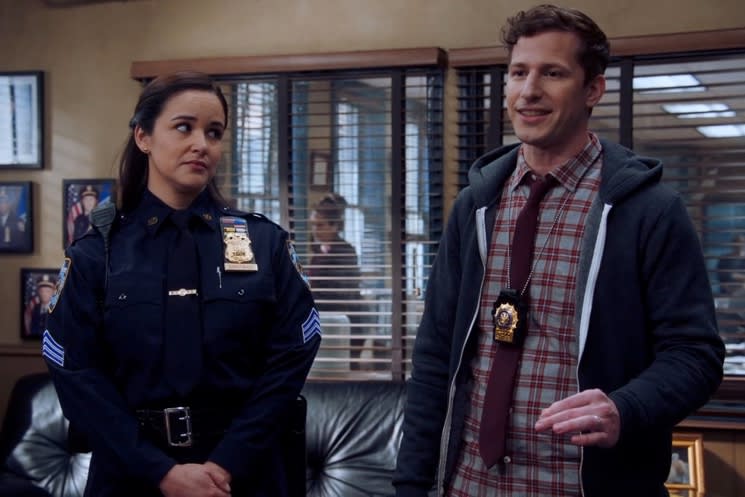Heading into its eighth and final season, Brooklyn Nine-Nine was in an impossible position. Increased public awareness of police brutality meant that it would be in poor taste for this cop sitcom to not address the situation — except the whole appeal of the show's first seven seasons was that they were light, breezy and fun. It's perhaps inevitable, then, that this final season is an awkward combination of tones, as it aims to be both insightful and funny and ends up being neither.
Last year, the show's writers were reportedly already several episodes deep into the season when, in response to a resurgence of the Black Lives Matter movement, they scrapped the whole thing and started over. The rewritten season begins with the crew grappling with a new outlook on policing: Rosa Diaz (Stephanie Beatriz) has quit to become a P.I. in order to help the public more directly, a union rep (John C. McGinley) is a slapstick caricature of a corrupt defender of police violence, and Charles Boyle (Joe Lo Truglio) is newly woke and trying way too hard to offer reparations to his Black colleagues.
The show's heart is in the right place, but it can't find a balance between taking a stand and being funny. An episode in which Jake Peralta (Andy Samberg) helps Rosa's client to fight a bogus charge feels like a clumsy attempt to put Jake on the right side of history; ditto his self-flagellating mea culpa after he wrongfully arrests someone a few episodes later. Raymond Holt (Andre Braugher) and Amy Santiago (Melissa Fumero) are working to defund the police and repair the former's failing marriage.
There's not much levity to be found amidst all these heavy storylines — especially when many of the jokes are repetitive gags about trying to sell Girl Guide cookies to Scully (Joel McKinnon Miller) and an uninspired reunion with Doug "The Pontiac Bandit" Judy. The second half of the season is thankfully stronger than the first: a trip to the Boyle family farm is a rare instance when the show finds its silly sweet spot (even if the Knives Out parody feels a couple years late), and the last couple missions are old-school B99 capers that mix crime-solving shenanigans with personal growth.
Brooklyn Nine-Nine has never been a realistic portrayal of policing — its diverse cast of supportive, tolerant officers was always wishful thinking, and this police department could only exist in a fictional universe. But Season 8 of Brooklyn Nine-Nine attempts to bring the sitcom into the real world, and it's no longer possible to buy into this cuteness of this warm-hearted precinct. Then again, Brooklyn Nine-Nine probably didn't have another option, as simply ignoring the problem would have been a disaster of another sort.
(Netflix)Last year, the show's writers were reportedly already several episodes deep into the season when, in response to a resurgence of the Black Lives Matter movement, they scrapped the whole thing and started over. The rewritten season begins with the crew grappling with a new outlook on policing: Rosa Diaz (Stephanie Beatriz) has quit to become a P.I. in order to help the public more directly, a union rep (John C. McGinley) is a slapstick caricature of a corrupt defender of police violence, and Charles Boyle (Joe Lo Truglio) is newly woke and trying way too hard to offer reparations to his Black colleagues.
The show's heart is in the right place, but it can't find a balance between taking a stand and being funny. An episode in which Jake Peralta (Andy Samberg) helps Rosa's client to fight a bogus charge feels like a clumsy attempt to put Jake on the right side of history; ditto his self-flagellating mea culpa after he wrongfully arrests someone a few episodes later. Raymond Holt (Andre Braugher) and Amy Santiago (Melissa Fumero) are working to defund the police and repair the former's failing marriage.
There's not much levity to be found amidst all these heavy storylines — especially when many of the jokes are repetitive gags about trying to sell Girl Guide cookies to Scully (Joel McKinnon Miller) and an uninspired reunion with Doug "The Pontiac Bandit" Judy. The second half of the season is thankfully stronger than the first: a trip to the Boyle family farm is a rare instance when the show finds its silly sweet spot (even if the Knives Out parody feels a couple years late), and the last couple missions are old-school B99 capers that mix crime-solving shenanigans with personal growth.
Brooklyn Nine-Nine has never been a realistic portrayal of policing — its diverse cast of supportive, tolerant officers was always wishful thinking, and this police department could only exist in a fictional universe. But Season 8 of Brooklyn Nine-Nine attempts to bring the sitcom into the real world, and it's no longer possible to buy into this cuteness of this warm-hearted precinct. Then again, Brooklyn Nine-Nine probably didn't have another option, as simply ignoring the problem would have been a disaster of another sort.
